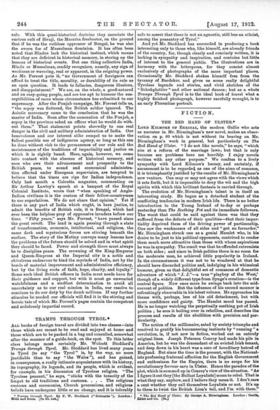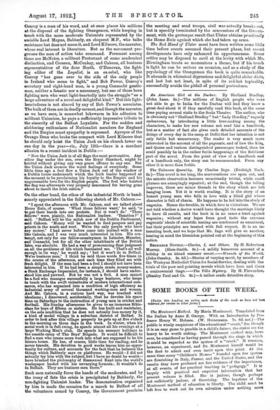FICTION.
THE RED HAND OF ULSTER.*
LORD KILMORE OF ERRIGAL, the modern Gallio who acts as narrator in Mr. Birmingham's new novel, makes an obser- vation on p. 60 which is not without its bearing on Mr. Birmingham's work in general, but particularly on The Red Hand of Ulster. "I do not like novels," he says, "which aim at a reform of the marriage laws ; but that is only because sex problems bore me horribly. I enjoy novels written with any other purpose." We confess to a lively sympathy with Lord Kilmore's heresy, and certainly, if amusement is to be regarded, as one of the aims of romance, it is triumphantly justified by the results of Mr. Birmingham's new venture. One may or may not agree with the views which it sets forth, but it is impossible to deny the wit and the high spirits with which this brilliant fantasia is carried through.
The evolution of Mr. Birmingham's talent is in itself an interesting study. He began as a detached student of the conflicting tendencies in modern Irish life. There is no better introduction to the Young Ireland of to-day or perhaps yesterday than The Seething Pot and its immediate followers. The worst that could be said against them was that they suffered from the defects of their qualities—that their impar- tiality deprived them of the driving power of partisanship. One saw the weaknesses of all sides and "got no forrarder." Mr. Birmingham struck one as a genial Hamlet who, in his desire to be just to his political opponents, contrived to render them much more attractive than those with whose aspirations he was in sympathy. The result was that he offended extremists on both sides ; and since in Irish politics there is no room for the moderate man, he achieved little popularity in Ireland. In the circumstances it was not to be wondered at that he should have discarded politics and, indulging in his whimsical humour, given us that delightful set of romances of domestic adventure of which "J. J."—a true "playboy of the West,' though of a widely different type from Synge's creation—is the central figure. Now once more he swings back into the mid- current of politics. But the influence of his second manner is refreshingly observable in his latest volume. He approaches his theme with, perhaps, less of his old detachment, but with more confidence and gaiety. The Hamlet mood has passed. He is no longer watching the perpetually seething pot of Irish politics ; he sees it boiling over in rebellion, and describes the process and results of the ebullition with precision and par- ticularity.
The notion of the millionaire, sated by society triumphs and resolved to gratify his buccaneering instincts by " running " a revolution, is, if not new in fiction, worked out on entirely original lines. Joseph Peterson Conroy had made his pile in America, but he was the descendant of an evicted Irish tenant, and deep down in his heart was a core of hereditary hatred of England. But since the time is the present, with the National- ists professing fraternal affection for the English Government and enthusiasm for the Empire, there is no scope for his revolutionary fervour save in Ulster. Hence the paradox of the plot, which is summed up in Conroy's view of the situation. "As I figure it out they [the Belfast Loyalists] mean to rebel. That is what they say, anyhow, and I believe they mean it. I don't care a cent whether they call themselves Loyalists or not. It's up to them to twist the British Lion's tail, and I'm with them."
• The Bed Hand of Ulster. By George A. Birmingliain. London : Smith, 'Ender and Co. [Boa Conroy is a man of his word, and at once places his millions at the disposal of the fighting Orangemen, while keeping in touch with the more moderate Unionists represented by the amiable Lord Moyne, Babberly, an eloquent M.P., who talks resistance but does not mean it, and Lord Kilmore, the narrator, whose real interest is literature. But as the movement pro- gresses the men of action take command. Foremost among these are McNeice, a militant Protestant of some academical distinction, and Crossan, McConkey, and Cahoon, all business representatives of the dour North. O'Donovan, the fight- ing editor of the Loyalist, is an ex-rebel, who like Conroy " has gone over to the side of the only people in Ireland who mean to fight," and Bob Power, Conroy's secretary and right-hand man, is a young Connacht gentle- man, neither a fanatic nor a mercenary, but one of those born fighting men who went light-heartedly into the struggle " as a large adventure of a novel and delightful kind." But this light- heartedness is not shared by any of Bob Power's associates. The bulk of them are in deadly earnest, and though the narrator, as we have seen, is somewhat lukewarm in his adhesion to militant Unionism, he pays a sufficiently impressive tribute to the sincerity of the Belfast Loyalists. For the sudden and slobbering enthusiasm of Nationalist members for England and the Empire scant sympathy is expressed. Apropos of the Orange Dean who broke the compact with Lord Kilmore that he should only hoist the Union Jack on his church tower on one day in the year—viz., July 12th—there is a mordant allusion to a recent incident in Dublin :- " Now the Union Jack is of all flags the most provocative. Any other flag under the sun, even the Royal Standard, might be hoisted without giving any very grave offence to any one. But the Union Jack arouses the worst feelings of everybody. Some little time ago a fool flew a Union Jack out of the window of a Dublin house underneath which the Irish leader happened at the moment to be proclaiming his loyalty to the Empire and his ungovernable love for the English people. The fool who hoisted the flag was afterwards very properly denounced for having gone about to insult the Irish nation: On the other hand, the ethos of the industrial North is hand- somely appreciated in the following sketch of Mr. Cahoon:— "I spent the afternoon with Mr. Cahoon, and we talked about Horne Rule, of course. What those fellows want,' he said, 'is to get their hands into our pockets. But it won't do.' `Those fellows' were, plainly, the Nationalist leaders. `Taxation?' I said. Belfast will be the milch cow of the Dublin Parliament,' said Cahoon. 'Money will be wanted to feed paupers and pay priests in the south and west. We're the only people who have any money.' I had never before come into contact with a man like Cahoon, and I was very much interested in him. His con- tempt, not only for our fellow-countrymen in Leinster, Minister, and Connacht, but for all the other inhabitants of the British Isles, was absolute. He had a way of pronouncing final judgment on all the problems of life which fascinated me. That's all well enough in its way,' he would say; but it won't do in Belfast. We're business men.' I think he said those words five times in the course of the afternoon, and each time they filled me with fresh delight. If the man had been a fool I should not have been interested in him. If he had been a simple crude money-maker, a Stock Exchange Imperialist, for instance, I should have under- stood him and yawned. But he was not a fool. A man cannot be a fool who manages successfully a large business, who keeps in touch with the swift vicissitudes of modern international com- merce, who has organized into a condition of high efficiency an industrial army of several thousand working-men and women. And Mr. Cahoon, in a curious hard way, was touched with idealisms ; I discovered, accidentally, that he devotes his spare time on Saturdays to the instruction of young men in cricket and football. His Sunday afternoons he gives to an immense Bible- class for boys of fifteen or sixteen. He has built and maintains, on the sole condition that he does not actually lose money by it, a kind of model village in a suburban district of Belfast. In order to look after this village properly he gets up at five o'clock in the morning on three days in the week. In, winter, when his social work is in full swing, he spends almost all his evenings at a large Working Men's club. He spends his summer holidays in the seaside camp of The Boys' Brigade. It would be difficult to find a man who crams more work into what are supposed to be his leisure hours. He has, of course, little time for reading, and he never travels. His devotion to good works leaves him no oppor- tunity for culture, and accounts for the fact that he believes the things which Babberly says on platforms. He would—I did not actually try him with the subject, but I have no doubt he would— have brushed the philosophy of Emmanuel Kant into the world's wastepaper basket with his unvarying formula : It wouldn't do in Belfast. They are business men there."
Such men naturally force the hands of the moderates, and by the irony of fate the crisis is precipitated by Babberly, the non-fighting Unionist leader. The demonstration organized by him is made the occasion for a march to Belfast of all the volunteers armed by Conroy, the Government proclaim the meeting and send troops, civil war actually breaks out, but is speedily terminated by the concessions of the Govern. ment, with the grotesque result that Ulster obtains practically the Home Rule against which she had taken up arms.
The Red Hand of Ulster must have been written some little time before events assumed their present phase, but recent developments have only enhanced its opportuneness. Some critics may be disposed to cavil at the levity with which Mr. Birmingham treats so momentous a theme, but if his touch is light he can be serious on occasion, and as a study of the psychology of the Orangeman the book is quite remarkable. It abounds in whimsical digressions and delightful obiter dicta, and last but not least, in spite of its red-hot topicality, successfully avoids the pitfall of personal portraiture.







































 Previous page
Previous page